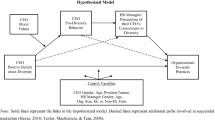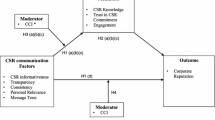Abstract
A conceptual model of the effect of psychological contracts and associated fairness perceptions on customer service organizational citizenship behaviors (CSOCB) is presented. Psychological contracts, individually held beliefs regarding employer-employee reciprocal expectations and obligations, provide a basis for the comprehensive perception of organizational justice. In turn, justice perceptions result in CSOCB, or externally directed extra-role behaviors. When customer contact employees perceive violations, these behaviors are likely to be either negative or a reduction of positive behaviors. Future research is discussed.
Similar content being viewed by others
References
Atchison, T. (1991). “ The Employment Relationship: Un-tied or Re-tied.” Academy of Management Executive 5(4 42–62.
Bateman, T. S., and D. W. Organ.(1983). “ Job Satisfaction and the Good Soldier: The Relationship Between Affect and Employee ‘Citizenship.’ Academy of Management Journal 26, 587–595.
Belous, R. S. (1989). The Contingent Economy: The Growth of the Temporary, Part-time and Subcontracted Workforce. Washington, DC: National Planning Association.
Bies, R. (1987). The Predicament of Injustice: The Management of Moral Outrage. In L. L. Cummings, and B. M. Staw (eds.), Research in Organizational Behavior (vol. 9) (pp. 289–318). Greenwich, CT: JAI Press.
Bitner, M. J., B. H. Booms, and L. A. Mohr.(1994). “ Critical Service Encounters: The Employee's Viewpoint. Journal of Marketing 58(4), 95–106.
Blancero, D. (1992). Non-union Grievance Systems: Perceptions of Fairness. Proceedings of the Forty-fourth Annual Meeting of the Industrial Relations Research Association (pp. 458–464). Madison, WI: IRRA.
Blancero, D., C. Lakshman, and S. A. Johnson.(1995). Psychological Contracts Fairness, and OCB: An Exploratory Study (pp. 205–210). Vancouver, BC: Association of Management Proceedings.
Blancero, D., and S. A. Johnson. (In progress). “Extending the Psychological Contract to a Customer Service Environment: A Triadic Relationship Model.” Manuscript. Arizona State University, Department of Management.
Bowen, D. E., C. Sieh, and B. Schneider.(1989). “ A Framework for Analyzing Customer Service Orientations in Manufacturing.” Academy of Management Review 14(1), 75–95.
Brief, A. P., and S. J. Motowidlo.(1986). “ Prosocial Organization Behaviors.” Academy of Management Review 11, 710–725.
Brockner, J., and J. Greenberg.(1990). The Impact of Layoffs on Survivors: An Organizational Justice Perspective. In J. Carroll (ed.), Applied Social Psychology and Organizational Settings (pp. 45–75). New York: Lawrence Erlbaum.
Caudron, S. (1993). “ How HR Drives TQM.” Personnel Journal 72(8), 48a-48o.
Dubinsky, A. J., and M. Levy.(1989). “ Influence of Organizational Fairness on Work Outcomes of Retail Salespeople.” Journal of Retailing 65(2), 221–253.
Dyer, L., and D. Blancero.(1992). Workplace 2000: A Delphi Study. CAHRS Working Paper 92–10. Center for Advanced Human Resource Studies, Cornell University, Ithaca, New York.
Dyer, L., and G. W. Holder.(1988). A Strategic Perspective on Human Resource Management. In L. Dyer (ed.), Human Resource Management: Evolving Roles and Responsibilities. Washington, DC: BNA.
Eschew, D. E. (1993). “ The Role of Organizational Justice in Organizational Citizenship Behavior.” Employee Responsib and Rights Journal 6(3), 185–194.
Farh, J. L., P. M. Podsakoff, and D. W. Organ.(1990). “ Accounting for Organizational Citizenship Behavior: Lender Fairness and Task Scope Versus Satisfaction.” Journal of Management 16(4), 705–721.
Folger, R., and M. Konovsky.(1989). “ Effects of Procedural and Distributive Justice on Reactions to Pay Raise Decisions.” Academy of Management Journal 32, 115–130.
Folger, R., and J. Greenberg.(1985). Procedural Justice: An Interpretive Analysis of Personnel Systems. In K. Rowland and G. Ferris (eds.), Research in Personnel and Human Resources Management (vol. 3) (pp. 141–183). Greenwich, CT: JAI Press.
George, J. M. (1991). “ State or Trait: Effects of Positive Mood on Prosocial Behaviors at Work.” Journal of Applied Psychology 76(2), 299–307.
George, J. M., and K. Bettenhausen.(1990). “ Understanding Prosocial Behavior, Sales Performance, and Turnover: A Group-level Analysis in a Service Context.” Journal of Applied Psychology 75(6), 698–709.
Gilliland, S. W. (1993). “ The Perceived Fairness of Selection Systems: An Organizational Perspective. Academy of Management Review 18, 694–734.
Greenberg, J. (1986). “ Determinants of Perceived Fairness of Performance Evaluations. Journal of Applied Psychology 71 340–342.
Greenberg, J. (1987). “ Reactions to Procedural Injustice in Payment Allocations: Do the Ends Justify the Means? Journal of Applied Psychology 72, 55–61.
Greenberg, J. (1990a). “ Organizational Justice: Yesterday, Today and Tomorrow.” Journal of Management 16(2) 399–432.
Greenberg, J. (1990b). “ Employee Theft as a Reaction to Underpayment Inequity: The Hidden Cost of Pay Cuts.” Journal Applied Psychology 75(5), 561–568.
Greenberg, J. (1993a). “ Justice and Organizational Citizenship: A Commentary on the State of the Science.” Employee Responsibilities and Rights Journal 6(3), 249–256.
Greenberg, J. (1993b). “ The Intellectual Adolescence of Organizational Justice: You've Come a Long Way, Maybe.” Socia Research 6(1), 135–148.
Greenberg, J. (1994). “ Using Socially Fair Treatment to Promote Acceptance of a Work Site Smoking Ban.” Journal of Ap Psychology 79, 288–297.
Greenberg, J., and C. McCarty.(1991). Comparable Worth: A Matter of Justice. In G. R. Ferris and K. M. Rowland (eds.), Research in Personnel and Human Resources Management (vol. 8) (pp. 265–301). Greenwich, CT: JAI Press.
Grover, S.L. (1991). “ Predicting the Perceived Fairness of Parental Leave Policies.” Journal of Applied Psychology 76, 247–255.
Henkoff, R. (1994). “ Finding, Training, and Keeping the Best Service Workers.” Fortune 129(19), 110–123
Kalleberg, A. L., and T. Reve.(1992). “ Contracts and Commitment: Economic and Sociological Perspectives on Employment Relations.” Human Relations 45(9), 1103–1132.
Kochan, T., M. Smith, J. C. Wells, and J. B. Rebitzer.(1994). “ Human Resource Strategies and Contingent Workers: The Case of Safety and Health in the Petrochemical Industry.” Human Resource Management 33(1), 55–77.
Konovsky, M. A., and R. Cropanzano.(1991). “ Perceived Fairness of Employee Drug Testing as a Predictor of Employee Attitudes and Job Performance.” Journal of Applied Psychology 76, 698–707.
Larsson, R., and D. E. Bowen.(1989). “ Organization and Customer: Managing Design and Coordination of Services.” Academy of Management Review 14(2), 213–233.
Martin, J., P. Brickman, and A. Murray.(1984). “ Moral Outrage and Pragmation: Explanations for Collective Action.” Journal of Experimental Social Psychology 20, 484–496.
McFarlane Shore, L., and L. Tetrick.(1994). The Psychological Contract as an Explanatory Framework in the Employment Relationship.In C. L. Cooper and D. M. Rousseau (eds.), Trends in Organizational Behavior (vol. 1) (pp. 91–109). New York: John Wiley.
McLean Parks, J., and N. Kidder.(1994). ‘Till death us do part...’ Changing Work Relationships in the 1990s. In C. L. Cooper and D. M. Rousseau (eds.), Trends in Organizational Behavior (vol. 1) (pp. 111–136). New York: John Wiley.
Moorman, R. H. (1991). “ Relationship Between Organizational Justice and Organizational Citizenship Behaviors: Do Fairness Perceptions Influence Employee Citizenship? Journal of Applied Psychology 76(6), 845–855.
Moorman, R. H., B. P. Niehoff, and D. W. Organ.(1993). “ Treating Employees Fairly and Organizational Citizenship Behavior: Sorting the Effects of Job Satisfaction, Organizational Commitment, and Procedural Justice.” Employee Responsibilities and Rights Journal 6(3), 209–226.
Motowidlo, S. J. (1984). “ Does job satisfaction lead to consideration and personal sensitivity? Academy of Management Journal (27), 910–915.
O'Reilly, B. (1994). “ The New Deal: What Companies and Employees Owe One Another.” Fortune 129(12), 44–52.
Organ, D. W. (1988). “ A Restatement of the Satisfaction-Performance Hypothesis.” Journal of Management 14(4), 547–557.
Organ, D. W., and M. Konovsky.(1989). “ Cognitive Versus Affective Determinants of Organizational Citizenship Behavior. Journal of Applied Psychology 74(1), 157–164.
Organ, D. W., and R. H. Moorman.(1993). “ Fairness and Organizational Citizenship Behavior: What Are the Connections? Social Justice Research 6(1), 5–18.
Parasuraman, A., V. A. Zeithaml, and L. L. Berry.(1985). “ A Conceptual Model of Service Quality and Its Implications for Future Research.” Journal of Marketing 49(4), 41–50.
Parasuraman, A., V. A. Zeithaml, and L. L. Berry.(1994). “ Reassessment of Expectations as a Comparison Standard in Measuring Service Quality: Implications for Further Research.” Journal of Marketing 58(1), 111–124.
Puffer, S. M. (1987). “ Prosocial Behavior, Non-compliant Behavior, and Work Performance Among Commission Salespeople.” of Applied Psychology 72(4), 615–621.
Rafaeli, A. (1989). “ When Cashiers Meet Customers: An Analysis of the Role of Supermarket Cashiers.” Academy of Management Journal 32(2), 245–273.
Reich, R. B. (1987). Tales of a New America. New York: Times Books.
Robinson, S. L., M. S. Kraatz, and D. M. Rousseau.(1994). “ Changing Obligations and the Psychological Contract: A Longitudinal Study.” Academy of Management Journal 37(1), 137–152.
Robinson, S. L., and E. W. Morrison.(1995). “ Psychological Contracts and OCB: The Effect of Unfulfilled Obligations.” Journal of Organizational Behavior 16, 289+.
Robinson, S. L., and D. M. Rousseau.(1994). “ Violating the Psychological Contract: Not the Exception But the Norm.” Journal of Organizational Behavior 15, 245–254.
Rousseau, D. M. (1989). “ Psychological and Implied Contracts in Organizations.” Employee Responsibilities and Rights Journal 2(2), 121–139.
Rousseau, D. M. (1990). “ New Hire Perceptions of Their Own and Their Employer's Obligations: A Study of Psychological Contracts.” Journal of Organizational Behavior 11, 389–400.
Rousseau, D. M., and R. J. Anton.(1991). “ Fairness and Implied Contract Obligations in Job Terminations: The Role of Contributions, Promises, and Performance.” Journal of Organizational Behavior 12, 287–299.
Rousseau, D. M., and K. Aquino.(1993). “ Fairness and Implied Contract Obligations in Job Terminations: The Role of Remedies, Social Accounts, and Procedural Justice.” Human Performance 6, 135–149.
Rousseau, D. M., and J. M. McLean Parks.(1993). The Contracts of Individuals and Organizations. In B. M. Staw and L. L. Cummings (eds.), Research in Organizational Behavior (Vol. 15) (pp. 1–43). Greenwich, CT: JAI Press.
Rousseau, D. M, and K. J. Wade-Benzoni.(1994). “ Linking Strategy and Human Resource Practices: How Employee and Customer Contacts Are Created.” Human Resource Management 33(3), 463–489.
Schneider, B., and D. E. Bowen.(1985). “ Employee and Customer Perceptions of Service in Banks: Replication and Extension.” Journal of Applied Psychology 70, 423–433.
Schneider, B., and D. E. Bowen.(1995). Winning the Service Game.” Boston: Harvard Business School Press.
Schneider, B., J. J. Parkington, and V. M. Buxton.(1980). “ Employee and Customer Perceptions of Service in Banks.” Administrative Science Quarterly 25, 252–267.
Smith, C. A., D. W. Organ, and J. P. Near.(1983). “ Organizational Citizenship Behavior: Its Nature and Antecedents.” Journal of Applied Psychology 68(4), 653–663.
Strutton, D., L. E. Pelton, and J. R. Lumpkin.(1993). “ The Relationship Between Psychological Climate and Salesperson-Sales Manager Trust in Sales Organizations.” Journal of Personal Selling and Sales Management 13(4), 1–14.
Tornow, W. W. (1988). “ Contract Redesign.” Personnel Administrator 34(10), 97–102.
Zeithaml, V. A., L. L. Berry, and A. Parasuraman.(1988). “ Communication and Control Processes in the Delivery of Service Quality.” Journal of Marketing 52(2), 35–48.
Author information
Authors and Affiliations
Rights and permissions
About this article
Cite this article
Blancero, D., Johnson, S.A. & Lakshman, C. Psychological contracts and fairness: The effect of violations on customer service behavior. J Market-Focused Manage 1, 49–63 (1996). https://doi.org/10.1007/BF00129603
Issue Date:
DOI: https://doi.org/10.1007/BF00129603




